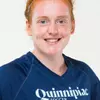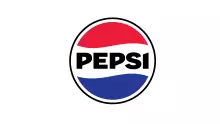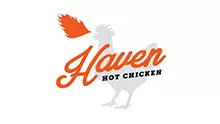
Success From Grass to Grades
10/12/2017 1:22:00 PM | Women's Soccer
Written by: Matt McAuliffe '20, special to QuinnipiacBobcats.com
The time slowly approaches midnight inside the Arnold Bernard Library on the Quinnipiac campus. One could hear the seconds slowly tick past, as there are little to no students left inside the library.
One who does remain is junior midfielder Madison Borowiec. She is studying. Her coffee that sits by the top right corner of her notebook is close to as black as the night outside the window. She's been here before, late nights in the library have become routine for her, after all she is a health science major, and so are 14 of her teammates.
The library at midnight is not where you will find one of Borowiec's teammates hitting the books however, redshirt senior midfielder Laura Nicholas is in a study group. Nicholas communicates and checks-in with her fellow peers as if she is guiding the ball and her team up the pitch into the offensive zone.
One who would receive her pass is redshirt sophomore defender Kylie Lance. Where can you find her? Lance is in the classroom being proactive, because she knows once class is dismissed all of her efforts will be put towards soccer.
Three women, three different work ethics, one goal. To succeed both in the classroom and on the pitch.
Now that is much easier said than done. In order to graduate with a health science degree at Quinnipiac a student must take around 18 credits a semester and participate in depending on the major's clinical studies, field work and labs out in the work force. For these student-athletes, they must participate and succeed in all of that, and balance the schedule and travel of a Division I athlete.
For Borowiec, however, the decision was easy.
"I knew my whole life that I wanted to do something sports and medicine related," Borowiec said. "I looked into it more and figured out what occupational therapy was and I thought that was a really good fit for me and the OT program here is nationally ranked so it was a good fit."
Nicholas's took the challenge of a loaded course load, and a Division I sport schedule head on, after all, a packed schedule has become a way of life for her.
"I think I work well when I have a lot to do, I like having a lot on my plate because it makes me not procrastinate and get everything done at one time," Nicholas said. "By challenging myself with soccer and the classroom I think that has helped me with my time management, and I've become a lot more effective and efficient in the way I work."
For Lance, it came down to seeing just how good Quinnipiac's health science programs were.
"I figured out what occupational therapy was and I thought that was a really good fit for me, and the OT program here is nationally ranked."
When athletes are being recruited at the Division I level touring schools turn into even more of a sales pitch than they already are. For certain soccer programs at the Division I level, they tell their players if they want to play at a certain school they can't be a health science major, they have to be more focused on winning soccer games than in the classroom. At Quinnipiac, their recruiting pitch goes in the opposite direction.
"In terms of what this school offers, it offers a top-rate medical school, and health science program, why not sell that," Quinnipiac head coach Dave Clarke said. "You can be a nursing major, you can be a physician's assistant major, you can be physical therapy, you can be occupational therapy, that builds up trust between the players and the coaching staff, we've never told a player you can't take a class."
If anyone should know about how important education is, it's Dave Clarke. He is a coach that has an education background and even taught at Quinnipiac University, he knows that at the end of the day, you go to college for the diploma.
"The most important thing is that they are here to graduate," Clarke said. "It shouldn't be one and a distant second, we create an environment where academics is 1 and soccer is sort of a 1A so that there is a symbiotic relation between the two."
His players are aware of his philosophy the moment they step foot on campus. Being able to pursue the major they want to, and play the game they love is a very appealing and attractive recruitment quality.
"I know this is one of the only programs where you can play a Division I sport and participate in such a highly-ranked health science program," Lance said. "Dave makes a good point of working with athletes so that they can get the education that they want."
Clarke's philosophy is clearly an effective one as last season his team placed 15 players on the Metro-Atlantic Athletic Conference All-Academic team. Also, last season for the 12th straight year the team earned National Soccer Coaches Association of America Academic recognition.
For a team that lost in the MAAC Championship game last year and received two academic awards, it is no question that this team knows how to success both on and off the pitch.
The time slowly approaches midnight inside the Arnold Bernard Library on the Quinnipiac campus. One could hear the seconds slowly tick past, as there are little to no students left inside the library.
One who does remain is junior midfielder Madison Borowiec. She is studying. Her coffee that sits by the top right corner of her notebook is close to as black as the night outside the window. She's been here before, late nights in the library have become routine for her, after all she is a health science major, and so are 14 of her teammates.
The library at midnight is not where you will find one of Borowiec's teammates hitting the books however, redshirt senior midfielder Laura Nicholas is in a study group. Nicholas communicates and checks-in with her fellow peers as if she is guiding the ball and her team up the pitch into the offensive zone.
One who would receive her pass is redshirt sophomore defender Kylie Lance. Where can you find her? Lance is in the classroom being proactive, because she knows once class is dismissed all of her efforts will be put towards soccer.
Three women, three different work ethics, one goal. To succeed both in the classroom and on the pitch.
Now that is much easier said than done. In order to graduate with a health science degree at Quinnipiac a student must take around 18 credits a semester and participate in depending on the major's clinical studies, field work and labs out in the work force. For these student-athletes, they must participate and succeed in all of that, and balance the schedule and travel of a Division I athlete.
For Borowiec, however, the decision was easy.
"I knew my whole life that I wanted to do something sports and medicine related," Borowiec said. "I looked into it more and figured out what occupational therapy was and I thought that was a really good fit for me and the OT program here is nationally ranked so it was a good fit."
Nicholas's took the challenge of a loaded course load, and a Division I sport schedule head on, after all, a packed schedule has become a way of life for her.
"I think I work well when I have a lot to do, I like having a lot on my plate because it makes me not procrastinate and get everything done at one time," Nicholas said. "By challenging myself with soccer and the classroom I think that has helped me with my time management, and I've become a lot more effective and efficient in the way I work."
For Lance, it came down to seeing just how good Quinnipiac's health science programs were.
"I figured out what occupational therapy was and I thought that was a really good fit for me, and the OT program here is nationally ranked."
When athletes are being recruited at the Division I level touring schools turn into even more of a sales pitch than they already are. For certain soccer programs at the Division I level, they tell their players if they want to play at a certain school they can't be a health science major, they have to be more focused on winning soccer games than in the classroom. At Quinnipiac, their recruiting pitch goes in the opposite direction.
"In terms of what this school offers, it offers a top-rate medical school, and health science program, why not sell that," Quinnipiac head coach Dave Clarke said. "You can be a nursing major, you can be a physician's assistant major, you can be physical therapy, you can be occupational therapy, that builds up trust between the players and the coaching staff, we've never told a player you can't take a class."
If anyone should know about how important education is, it's Dave Clarke. He is a coach that has an education background and even taught at Quinnipiac University, he knows that at the end of the day, you go to college for the diploma.
"The most important thing is that they are here to graduate," Clarke said. "It shouldn't be one and a distant second, we create an environment where academics is 1 and soccer is sort of a 1A so that there is a symbiotic relation between the two."
His players are aware of his philosophy the moment they step foot on campus. Being able to pursue the major they want to, and play the game they love is a very appealing and attractive recruitment quality.
"I know this is one of the only programs where you can play a Division I sport and participate in such a highly-ranked health science program," Lance said. "Dave makes a good point of working with athletes so that they can get the education that they want."
Clarke's philosophy is clearly an effective one as last season his team placed 15 players on the Metro-Atlantic Athletic Conference All-Academic team. Also, last season for the 12th straight year the team earned National Soccer Coaches Association of America Academic recognition.
For a team that lost in the MAAC Championship game last year and received two academic awards, it is no question that this team knows how to success both on and off the pitch.
Players Mentioned
Quinnipiac Athletics 2024-25 Highlight Video
Tuesday, May 20
WSOC vs Canisius (MAAC Semifinals)
Thursday, November 07
WSOC vs Iona (MAAC Quarterfinals)
Sunday, November 03
Women's Soccer vs Iona
Saturday, October 26
































